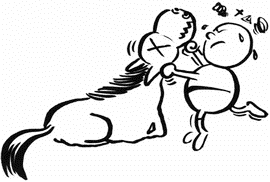 Last night the mailbox contained the latest copy of QST magazine, which always means at least a few minutes of interesting reading. I usually read the magazine more or less front to back, flipping through. I mostly enjoy technical content, but reading about other aspects of the hobby (contesting, etc…) as an interesting diversion.
Last night the mailbox contained the latest copy of QST magazine, which always means at least a few minutes of interesting reading. I usually read the magazine more or less front to back, flipping through. I mostly enjoy technical content, but reading about other aspects of the hobby (contesting, etc…) as an interesting diversion.
Sadly, some things are more irritating than diverting, such as the “Letters from Our Members” on page 24. For the last couple of months, some insist on perpetuating the endless whining about the decreasing quality and experience of the newly licensed. Some small samples:
I feel that hams still need to spend at least two years in each license class before upgrading. I have always thought it was the Extra class licensees who we all looked up to because they had the experience that the lower license classes did not have.
Paul Eaton, KR4IN
Morse code is what distinguishes hams from other hobbyist wireless communicators; it’s really the only differentiator. …
The excuse about being handicapped might have great merit for some, but not for me. I know and have worked hams who are blind, deaf, and paraplegic many times. …
Steve Katz, WB2WIK
When I read stuff like that, it just makes me weary for our hobby, even more so that QST chooses to continue to devote inches of their magazine to give a soapbox to such counter-productive discourse.
Paul is basically trying to make the assertion that the Extra license used to mean something that it no longer does: that if someone held an Extra class license, you could be assured that they knew what they were doing, that they were the acme of our hobby. I would submit that it was never true: that as long as so-called “incentive licensing” has been around, the only thing that you could be reasonably assured of was that someone had taken the required tests and received a passing grade. The idea that an amateur license conveys some expertise in itself is just credentialism: it prevents you from actually having to through the effort of actually trying to determine the skills and knowledge of someone else before you pass judgement upon them. There are hams who hold the “lowly” Technician class licenses who are incredibly skilled and knowledgeable, and Extras of many decades who are not. Judging someone’s abilities based upon simple measures like how long they’ve been licensed or what class they achieved is fraught with peril.
A ham radio license is like a fishing license. It’s a way for the government to limit access to a scarce shared resource that they manage for the benefit for society. The government’s interest in testing you is to ensure that you use the resource in a way which is not harmful to other spectrum users, and without significant risk to the public. And that’s it. All the other items listed as purposes in Part 97 are our shared responsibility as hams: to self-train, to help our communities in times of emergency, and advance the radio arts. Those responsibilities are what all hams should aspire to do, regardless of license class, regardless of experience level.
And Morse as the “only differentiator”? Sigh.
First of all, I wonder just who these other “hobbyist wireless communicators” are that Steve is referring to? Is he talking about CBers? People who use the FRS or MURS? Or perhaps the myriad wireless users of Part 15 based wireless access points? It’s true, most/all of these services do not use Morse, but is that the only differentiator? Really? As hams, we are empowered by our license to build our own equipment and operate on frequencies and modes which are not available to the operators of any of these other radio services. And of course we are challenged to train and learn more about radio, which was never really a cultural component of any of the other “hobbyist” wireless options. Surely those distinguish us rather strongly from these other services.
And the fact that Steve does not accept the fact that there are people whose handicaps could keep them from passing a Morse code test does not actually mean that such people do not exist. But more than that: why should a parapalegic or deaf person have to struggle more to become a radio amateur than someone without these physical difficulties? After all, there are plenty of able bodied hams who struggled to pass these tests, only to never use Morse again. The service is not enriched by such people or their struggle. It’s simply not relevant.
Hams like Steve and Paul are dinosaurs: clinging to a view of ham radio that’s not healthy or relevant. The credential doesn’t mean what Paul thinks it should. The importance of Morse is much, much slimmer than Steve thinks it is. Neither attitude encourages anyone to participate in this great hobby. They are just beating a dead horse.
